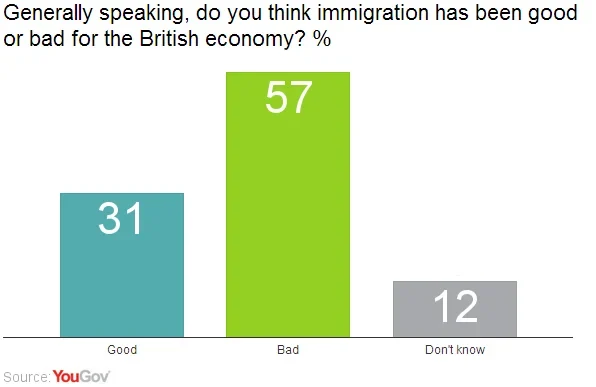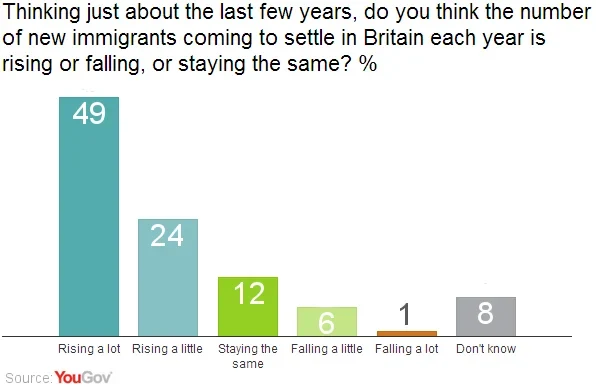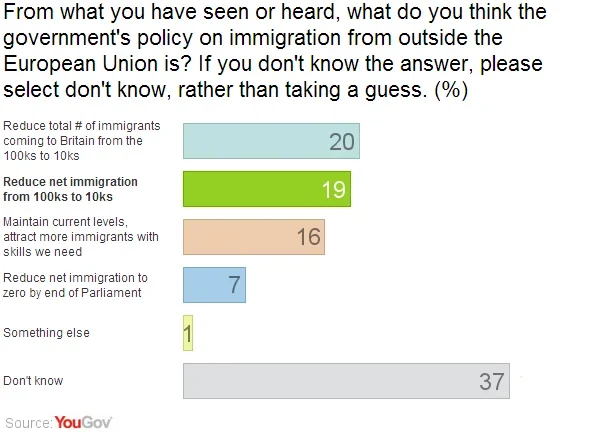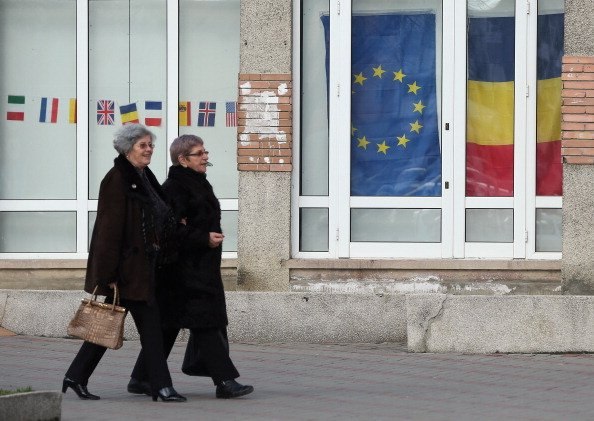Immigration is not just one of the biggest and most sensitive issues in British politics; it also exposes one of the great and widening rifts between most of the people and much of the political and chattering classes.
During the past fortnight, YouGov has conducted surveys on the issue for The Times and Sunday Times.
- Detailed economic studies, for example by the National Institute for Economic Research, insist that Britain’s economy has benefited from immigration in recent years; but by 57-31%, British voters disagree

- Official statistics show the number of immigrants coming to Britain has dropped significantly in the past few years; but only 7% believe this. As many as 73% think immigration is ‘higher than a few years ago’, while a further 12% think the number ‘is staying about the same’.

- Asked what they believe the Government’s target for immigration to be, only 19% know that it is to reduce net immigration from hundreds of thousands a year to tens of thousands

Want to receive Peter Kellner's commentaries by email? Subscribe here
It’s a moot point whether voters are not paying attention, or simply don’t believe official statistics, economic analyses or politicians’ promises. I suspect that disbelief rather than ignorance is the main explanation. Mountains of YouGov research show how little respect voters have, not just for politicians but for other pillars of British society.
This interpretation would help to explain another set of findings. When people are asked about immigration overall, they think it is far too high and doing great damage. But when the same people are asked about immigrants as people, much of the resentment melts away. We asked respondents to consider seven different groups and say whether we should admit more, fewer or about the same as we do today:
| Who Should be admitted to Britain | % wanting current numbers maintained or increased | % wanting fewer immigrants of none in this group | Net Support for current or increased numbers |
|---|---|---|---|
Wealthy people looking to invest in Britain | 71 | 19 | +52 |
People wanting to study at UK universities | 68 | 25 | +43 |
People with high education, skills and looking for work | 63 | 29 | +34 |
People looking to work in the NHS | 50 | 39 | +11 |
People fleeing war or persecution | 48 | 38 | +10 |
People wanting to join relatives already here | 33 | 57 | -24 |
People with low education, skills and looking for work | 13 | 72 | -59 |
As those figure show, five of the seven groups provoke a positive net response, with more people saying the numbers should be at least as they are today, than saying the numbers should be reduced. As for the other two groups. The rules are already restrictive, with people from outside the European Union already finding it hard to settle here legally if they are seeking low-skilled jobs or just want to join relatives already settled here.
In large measure, then, it’s not specific immigration policies that voters reject, but the belief that they are too easily evaded and/or not fully enforced.
That said, there is one feature of current immigration policy that most voters do dislike. By almost two-to-one they want the European Union to scrap the right of free movement throughout the EU. In asking the question we made clear that this freedom cuts both ways, with Britons able to live and work elsewhere in the EU and citizens of other EU countries to settle here. By 52-29%, voters want David Cameron to seek to end these rights as part of his proposed renegotiation of the United Kingdom’s relationship with the EU.
The importance of this is underlined by responses to another question. We listed ten possible issues for renegotiation and asked people to identify up to three that mattered most to them. ‘Greater control of our borders and immigration from the EU’ was the runaway winner, picked by 57%. It was the first choice of every social, political and demographic group. The next two – our ability to determine our own trade policies, and set our own human rights laws – came a distant, joint second, on 27%.
If anything, the political potency of this issue is likely to rise rather than fall in the near future. In just over five weeks’ time Romanians and Bulgarians will be able to live wherever they want within the EU. Expert views differ on how many will want to come to Britain. Official figures may take some months to settle down – and, even then, may not be believed, should they report figures at the lower end of current predictions.
Immigration, then, is not going to go away as one of the hottest of political potatoes in the run-up to next year’s elections to the European Parliament and the following year’s general election. Plainly voters want either new restrictions of free movement within the EU – or persuasive evidence that it’s not as big a problem as most people now think. And moves to stop new immigrants claiming early welfare benefits would certainly be popular.
But the larger challenge is to reconnect the world of political statements, statistical data and economic analyses to the perceptions and experiences of tens of millions of voters. As long as those two worlds remain far apart, I doubt if any government will be given any credit for what it sets out to do or claims to achieve.
Want to receive Peter Kellner's commentaries by email? Subscribe here
See the full immigration results here
Image: Getty










